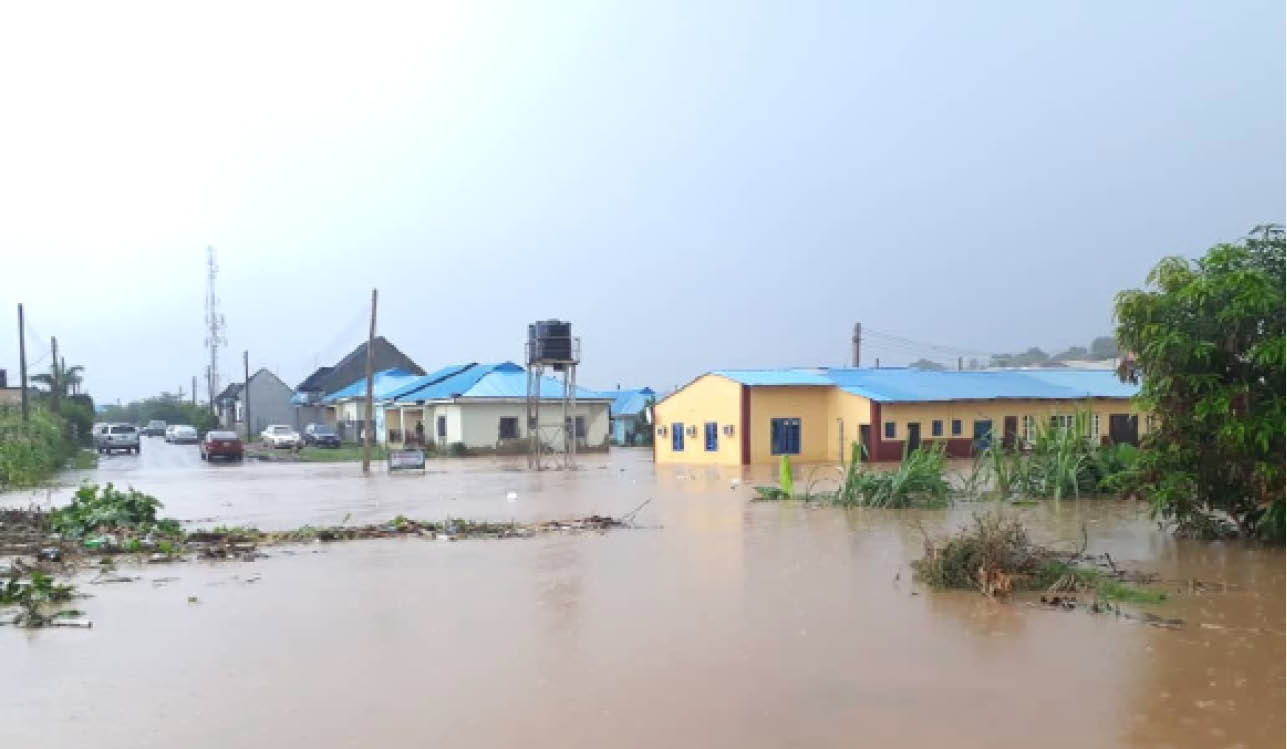The Nigeria Hydrological Services Agency (NHSA) has warned states and other stakeholders to be ready for flood this year.
The Director-General of the agency, Clement Nze, who gave the warning in Abuja last Wednesday, noted that previous attempts to get the state governments to work with its flood forecasts failed to yield the desired results.
- Imo attacks: IPOB building armoury to actualise Biafra – Ex-AIG
- Don’t let anarchists take over your region — ACF urges South East leaders
He added that 317 local government areas across the 36 states and the Federal Capital Territory (FCT) were affected by floods last year. This resulted in deaths and destruction of property, including farmlands, which were washed away.
The agency named the high-risk areas to include: Abia, Adamawa, Anambra, Bauchi, Bayelsa, Benue, Cross River, Delta, Ebonyi, Edo, Ekiti, Enugu, Gombe and Imo states. Others are Kaduna, Kebbi, Kogi, Kwara, Lagos, Nasarawa, Niger, Ogun, Plateau, Rivers, Sokoto, Yobe, and Zamfara states.
The agency said flood incidents in Nigeria are worsened by trans-boundary inflow of rivers Niger and Benue whenever excess water is released from Lagdo dam in Cameroon or the dams across the River Niger.
These floods have caused much havoc. For example, in Jigawa, the State Emergency Management Agency (SEMA) confirmed that by the middle of September last year, 21 persons lost their lives while about 51 families were displaced. The floods affected 17 of the state’s 27 local government areas with Gwaram, Birnin Kudu, Kirikasamma and Gumel as the worst hit.
In Niger State, floods affected 63,571 individuals in 150 villages across 20 of the 25 LGAs of the state. Governor Abubakar Bello said over 17,000 people were displaced and 7,619 houses affected, blaming the disaster on the spillover from the Kainji dams.
These are just two states. The list of states affected yearly by flood goes on and on. Apart from displacing citizens, it diminishes Nigeria’s food security infrastructure and needs. According to estimates by the Rice Farmers Association of Nigeria (RFAN), floods, last year, washed away at least two million tons of rice in Nigeria, more than 25 per cent of the previously projected national output of eight million tons. At least 450,000 hectares (1.2 million acres) were destroyed in Kebbi, the country’s main rice-growing state, according to Mohammed Sahabi, the state chairman of RFAN.
Farmers in five other states of Kano, Niger, Enugu, Jigawa and Nasarawa, also counted their losses. Other crops such as sorghum, millet and corn were affected.
The most annoying part of this issue is that despite the fact that the disaster occurs every year, it appears there is no solution to it in sight. Every year when it happens, the authorities will make pledges to address it but nothing tangible will be done until another rainy season comes.
It is time to stop paying lip service to the issue and actually take action. We condemn the states and local government authorities for abandoning their responsibilities. Efforts should be made by state governments to relocate all those living in flood-prone areas once and for all.
Apart from the states and LGAs, Nigerians should know that they are endangering their health and lives by living in flood-prone areas. They should learn to adhere to all instructions and early warnings from relevant government agencies. This is because most of the deaths and destruction recorded during floods are as a result of non-compliance to the rules, regulations or early warning alerts.
Also, citizens should stop contributing to the crisis by dumping waste in drainage. They should endeavour to dispose of their wastes properly. In the past, a day was set aside every month when citizens were made to clean their environments. Such should be restored so that the drainage can be kept free of waste at all times to allow for the free flow of water. The state and local government authorities should monitor such exercises and provide assistance where necessary. Governments at all levels should independently engage in the clearing of drainage as well.
In addition, all stakeholders, federal, states, LGAs, private and other non-governmental organisations (NGOs) should work out ways of converting refuse to other beneficial uses through recycling, including the waste to power initiative, manure and fertiliser.
More importantly, we call on the federal government and international donor agencies to support the initiative through the timely provision of adequate funds.

 Join Daily Trust WhatsApp Community For Quick Access To News and Happenings Around You.
Join Daily Trust WhatsApp Community For Quick Access To News and Happenings Around You.


